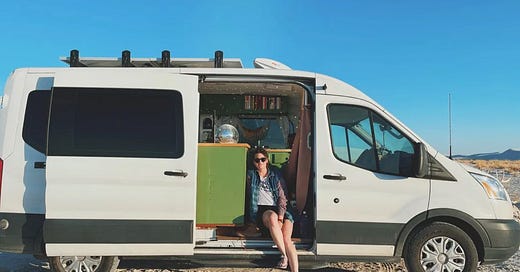I’ve always enjoyed being The Driver. People ask me how I deal with being alone on the road for hours on end and honestly, I’ve never seen it as a burden. When you turn 16 before most of your friends and inherit your older brother’s 2006 Saturn Ion (which still runs to this day, thank you very much!), it’s a natural progression from “friend with a car” to The Driver. There’s so much freedom in being The Driver — sure, you can ask for input on where to stop to eat or what time to leave in the morning, but ultimately, you have control of the day. You assume the risk of something going wrong of course, but if it does, The Driver is given so much leeway from the passengers as an acknowledgment of how much work it is to drive. But it’s never been work. At least not for me.
To love being The Driver, I suppose you have to first love being on the road. There is no memory of my childhood that doesn’t include significant portions of said memory on the road. Every year, my dad, mom, brother, and I would make at least two pilgrimages to my mom’s hometown in West Virginia - an easy 7-hour drive - and to my dad’s hometown of New Orleans - closer to 14, but sometimes we’d luck out and stop at grandma’s first in Mississippi, only 12 hours. This would happen at least once a year around the holidays but tended to replicate throughout the year for various occasions, like getting the kids down to grandma’s for a few weeks in the summer.
Not only that, every single vacation we took as a family included driving thanks to my mother’s core vacation policy: we’ll only ever be here once, so we have to see it all now. I realize in adulthood that this was more of an economic decision than a strategic one, but she wasn’t wrong: it’s not like I’d been back to the Grand Canyon since 2001, until recently, of course. The National Parks were common summer vacation trips for us, often ticking off as many locations as we could fit into 10 days of PTO. These vacations tended to be more productive than relaxing, but at least half of my memories of the Grand Canyon or Yellowstone or even grandma’s house are not of those places at all — they’re about getting there.
Back to The Driver. To be The Driver, one must have an excellent appreciation for and understanding of their own constitution. Anyone can, technically, drive: The Driver is aware of their energy level, their bodily fluids, their temperament, their focus. The Driver is responsible for a very large, dangerous machine and many, many human lives. Comes to think of it, we should all treat driving a helluvalot more seriously day to day than we do now. These are death machines, unnatural creations we’ve not only invented but built an entire society around. The Driver has an awesome responsibility to neither kill nor be killed while barreling down a hot black highway, speeding past a million tiny potentials for a slip of the hand or a seconds-delayed judgment call. It’s all quite terrifying, actually. Why did we build a society like this, again?
Maybe that’s the central question of this body of work: why are we living like this? Why, in 2022, is a generation of educated, ambitious, hardworking people living in the richest country in the history of the world suffering? Why can so few of us imagine owning a home and raising a family? Should we even be disappointed that we can’t “move up” in an economic system that was designed to keep most people indentured to working meaningless jobs in lonely conditions until, one day, we just die?
In the past nine months, I’ve put about 25,000 on my 2016 Ford Transit. I’ve met so many people in some state of post-Covid transition, looking for… something else. Some are looking for affordable homes, but most are looking for homes in places that feel worth calling home, with people who feel like home. A sense of ambiguous floating plagues most of them, as anxiety that they’ll never be able to find a home lives quietly in the back of their minds. If they haven’t been officially priced out of their homes, they’ve at least experienced the erosion of their community by big tech campuses, empty Airbnb’s, or the loss of friends who move to find a better situation for themselves. And the ones who do leave are often met with unfriendly locals, who feel their own communities are no longer their own. It’s a swirling mass of blame and anger towards each other rather than any collective, productive frustration at people and institutions that pushed us to the brink of what feels like a total societal collapse.
As The Driver, you get to decide where to go and what to prioritize. The freedom of choice is as much a blessing as it is a burden, plaguing me with endless options and no need to commit to anything except the road. And it seems more and more that American society itself is at a crossroads of options, with no promises of a better tomorrow, even in theory. So here we are. On the road, alone, together, figuring out what the fuck to do next. Come for a ride with me.




Let us go, then, you and I ...
Love the invitation to the reader to come along for the ride (drive).